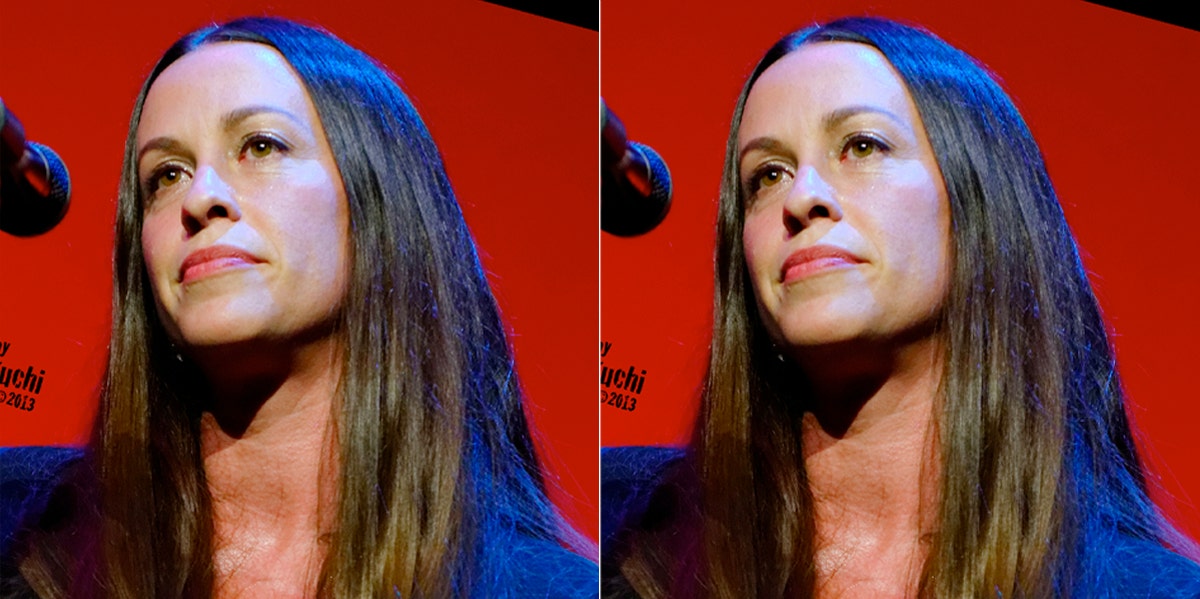Alanis Morisette Says She Was Raped At 15 — And Her 2002 Song 'Hands Clean' Details What Happened
You oughta know about her story.
 Justin Higuchi from Los Angeles, CA, USA, CC BY 2.0
Justin Higuchi from Los Angeles, CA, USA, CC BY 2.0 In the new HBO documentary about Alanis Morisette called "Jagged," Morisette details the difficulties of navigating the music industry in the '90s and being sexually abused at 15-years-old.
The documentary, which Morisette has said she doesn't support as it was not the story she "agreed to tell," will debut on HBO on Nov. 19.
When discussing Morisette's past sexual trauma in the film, she told director Alison Klayman that she’s “going to need some help because I never talk about this."
Alanis Morisette says she was raped by multiple men in her new documentary.
In the film, she explains that she had multiple sexual encounters when she was only 15-years-old which classify as statutory rape.
But a look back on her music reveals she's been struggling with telling her story for a long time.
RELATED: How A Sexual Assault Victim’s Mind Is Her Sanctuary
"I would always say, you know I was consenting. And then I’d be reminded, ‘Hey — you were 15. You’re not consenting at 15.’" she added, "Now, like, oh yeah — they’re all pedophiles. They’re all statutory rape.”
Alanis Morisette's music explores her sexual abuse.
We can also get a glimpse of Morisette's past sexual trauma and feelings in her songs from the early 2000s.
Her 2002 song "Hands Clean," is reportedly her recollection of a forbidden sexual relationship with a much older man when she was approximately 14 years of age.
The beginning of the song explains she was with someone more mature than her and he seemed to become successful because of Morisette's fame.
"If it weren't for your maturity, none of this would have happened. If you weren't so wise beyond your years I would've been able to control myself. If it weren't for my attention, you wouldn't have been successful, and if it weren't for me you would never have amounted to very much," she sings.
RELATED: How Using Safe Words Helped Me Reclaim My Sexuality After Trauma
She then goes on to say, "This could be messy but you don't seem to mind...no one knows except the both of us and I have honored your request for silence And you've washed your hands clean of this."
A Rolling Stone article at the time wrote that it was "an apparently matter-of-fact reminiscence of underage sex with a music-business mentor, an affair 'under rug swept."
Another song of hers titled "Flinch" on the same album is about Morisette feeling ashamed and embarrassed after seeing an ex-boyfriend, who was the older man she dated when she was 14, and how much he still affects her.
She claims that in the song she'll eventually "grow up and I won't even flinch at your name."
Morisette has criticized the upcoming 'Jagged' documentary.
Morisette reportedly had to sit for hours being interviewed for the documentary during a "very vulnerable time” according to her publicist, while she was in the midst of her “third postpartum depression during lockdown.”
“I was lulled into a false sense of security and their salacious agenda became apparent immediately upon my seeing the first cut of the film,” said Morisette.
"I sit here now experiencing the full impact of having trusted someone who did not warrant being trusted,” she continued. “I ultimately won’t be supporting someone else’s reductive take on a story much too nuanced for them to ever grasp or tell.”
Morisette has a reason to be upset as she stated every time she shares news of her past sexual trauma, it had “kind of fell on deaf ears.”
RELATED: Men: When Women Talk About Their Trauma, Your Job Is Just To Listen
The reason why Morisette doesn't talk about her sexual trauma as much is that women who come forward with sexual abuse allegations often aren’t believed.
“A lot of people say, ‘Why did that woman wait 30 years?’ I’m like fuck off, they didn’t wait 30 years. No one was listening, or their livelihood was threatened, or their family was threatened. So yeah, the whole ‘Why do women wait’ thing? Women don’t wait. A culture doesn’t listen.”
According to Marriage and Family Therapist, Frances Patton, unfortunately, too many girls have this experience.
"Telling the story in front of the legal system is terrifying for a young person, and is a violating experience all over again. Sexual abuse violates you at your most personal level. You lose control over yourself, your body, and your privacy. You lose your trust of other people."
Patton says the pain doesn't go away by itself, any sexual experience can bring back emotions and trauma, "Even if you don't remember the trauma, the emotions can come back. Some victims find themselves unable to trust a partner, engage in sexual activity, or trust anyone again."
Megan Hatch is a writer at YourTango who covers news & entertainment, love & relationships, and internet culture. Follow her on Twitter and Instagram.
